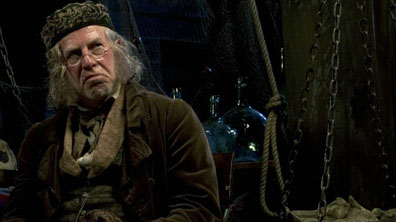It’s a stormy night here in New York the day after the holiday. What better than to sit down with a DVD set and forget all about debt. Only we chose one of those BBC classics, in this case Bleak House. And the literary canon is about nothing other than debt.
It can be said that the realist or bourgeois novel is the story of debt. Consider: Balzac, nothing but debt. Dostoevsky, all debt. In George Eliot, much turns around the screw of debt, especially in Daniel Deronda and its gambling debts and bankruptcies, and so on and so forth across the Great Tradition, all the way to Joyce’s Leopold Bloom, wandering his Bloomsday about Dublin, worried about his debts and how much he can spend.
Here there are both kinds of debt, or better three kinds. There is monetary debt of course. These debts are owed to shady money lenders, like Fagin. There is money raised on speculative lending like the nouveaux riches in Jane Austen’s Mansfield Park, wealthy on slavery. There is an immense amount of obligation, whether due to class, family or religion that often constrains the characters and drives the plot. It is the function of the police in the novels to determine the secret that characterizes the obligation. Sometimes the text argues against such obligations and it does so in the name of love, the required rebellion of the imperial bourgeoisie, but also a genuine form of relation.
So in Bleak House in the BBC/PBS version from 2005, much centers around monetary debt, as if prefiguring the 2007 crisis to come. Smallweed, a minor character in the novel, comes to personify predatory debt. Dickens made his character disabled and full of violent rage. The BBC added the obligatory hints of Jewishness. Dickens tells us of Smallweed:
The name of this old pagan’s god was Compound Interest. He lived for it, married it, died of it.
He lives by buying up secondary debt and making what he can of it. So Mr. George and Captain Hanwood and many other characters in Bleak House come to their downfall by means of this debt. No Jubilees intervened against the Law that Dickens represented as a suffocating smog, reaching across England.
Does it end happily nonetheless? You wouldn’t want me to spoil it, now, would you?

